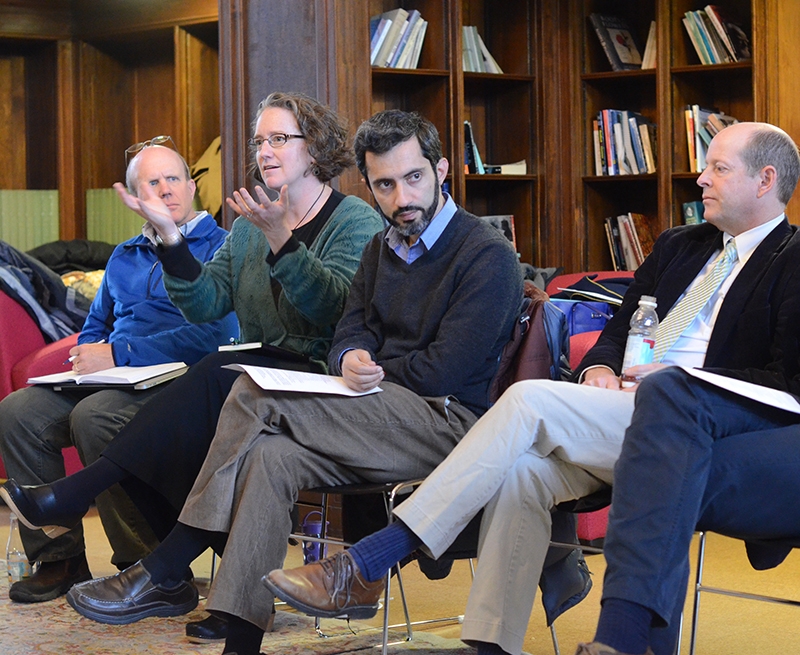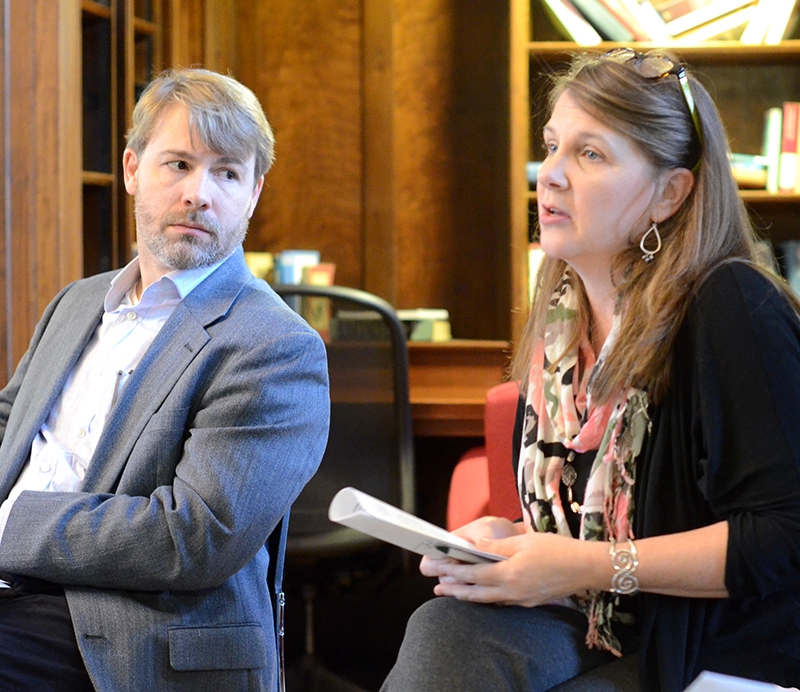Sophomore Seminar Asks ‘What is a Life Well Lived?’

MIDDLEBURY, Vt. – Middlebury faculty from across the disciplines gathered on December 1 to discuss the future of the Sophomore Seminar – a pilot project now in its third year that addresses some of the distinct challenges that face second-year college students.
“Very often we find that sophomores don’t know precisely why they are at Middlebury,” said Professor Patricia Zupan. “This is a matter of critical institutional concern. [Students] don’t always reflect on what they are doing here, why they are doing it, and how it is relevant to them.”
The lunchtime discussion centered on the course INTD 0210: Sophomore Seminar in the Liberal Arts, which has been offered at Middlebury since the fall of 2013 with funding support from the National Endowment for the Humanities.
The seminar poses the question, “What is the good life and how should I live it?” and its syllabus combines traditional academic activities with co-curricular events and pursuits. There are papers and presentations, and readings from the Bible, Koran, Aristotle, Emerson, Thoreau, Dewey, bell hooks, Eva Brann, and others. Students in the course are also required to attend relevant lectures, art exhibits, discussions, and performing arts events. The practice of meditation and contemplation is central to the seminar, which has been offered in two sections each semester since the inception of the project.
Funding from the NEH’s “Enduring Questions” grant program runs through the spring of 2016, and faculty and administrators are in discussion about future development of the course and whether to offer it to students outside of the sophomore class.
The discussion hosted by the Humanities Steering Committee and the dean for faculty development and research attracted professors from English and American literatures, psychology, film and media culture, economics, Italian, history, music, American studies, religion, biology, education studies, philosophy, and sociology/anthropology.
The Sophomore Seminar attempts to cultivate in students the ability to produce well-argued and well-developed personal responses to readings and activities. Professor Zupan, who helped write the grant proposal and has taught the elective course three times, said, “When we ask our students to write in the ‘I’, they are almost upset about it… They are very used to being told what to do and to give it back to their professors. They are disturbed when someone asks them, ‘What do you think?’ as opposed to what others are telling them to think.”
It is a challenge to teach students to write in the first person, Zupan said, and the Sophomore Seminar has been successful at doing so.
Other faculty in attendance offered their views on the seminar, including the pros and cons of designating the Sophomore Seminar a “College Writing” course, the flexibility for faculty to teach a Sophomore Seminar in place of a First-Year Seminar, the connectivity of the seminar to other centers and institutes on campus, and how one’s vocation affects broader questions about one’s “life’s work.”

The funding source for the seminar, the NEH, will not be funding its “Enduring Questions” program after 2016, so the College has some decisions to make about moving forward with the Sophomore Seminar.
Assistant Professor Deb Evans also helped write the grant and has taught the course. (The other directors of the project are faculty members Brett Millier and Jonathan Miller-Lane.) Evans sees the course as a valuable addition to the curriculum and says questions about life after Middlebury often come up in the Sophomore Seminar.
“Students ask about a life well lived and how they can reconcile that with the career they are about to step into,” she said. “The benefit of this kind of radically flipped classroom is that it gives students the room and space to bring these questions to bear on the texts we are discussing.”

